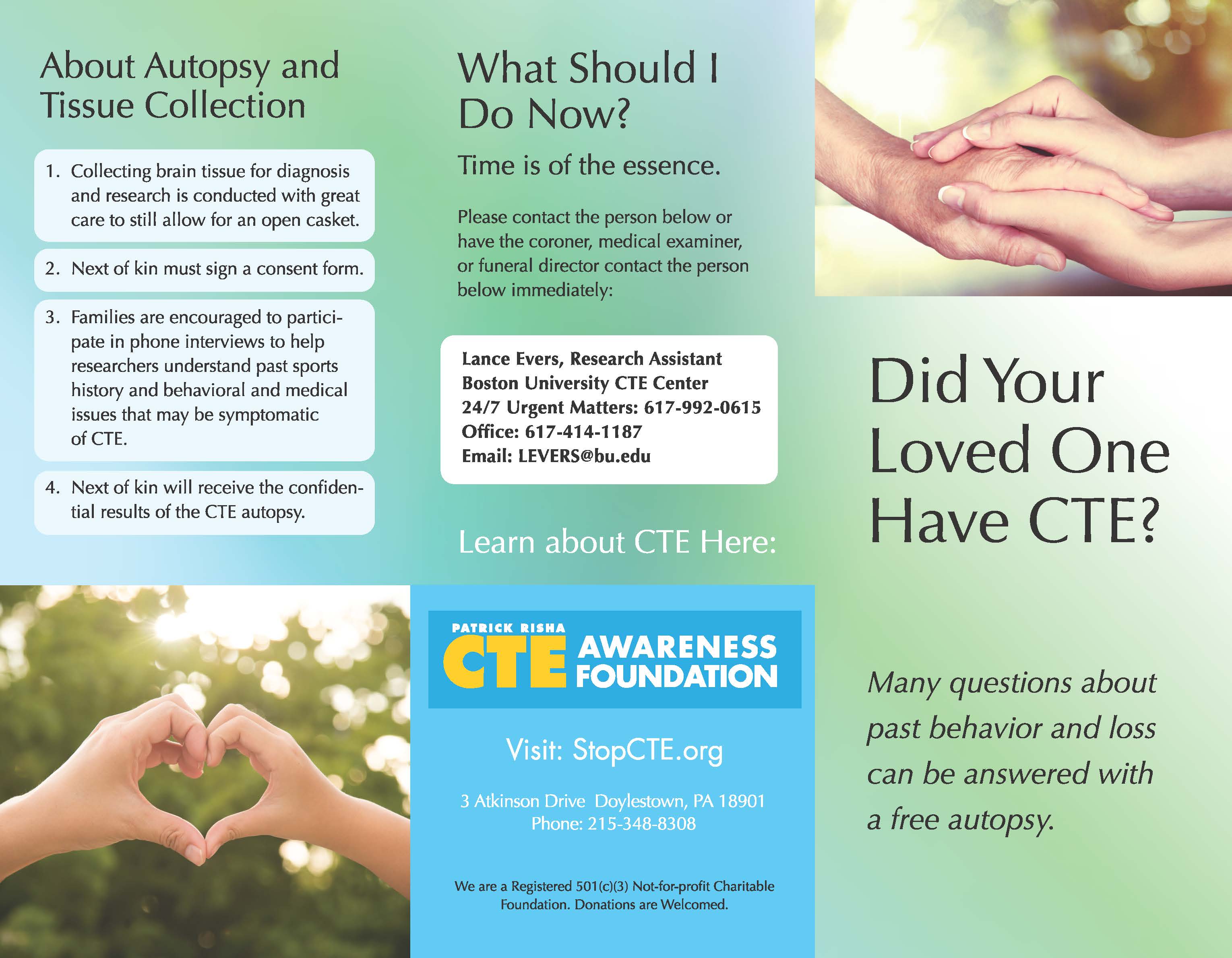Brain Autopsy Brochure Here

We urgently need your help…
Print letter about brochure here Brochure Invite
Why Donate?
The purpose of our research is to help understand the long-term effects of head trauma and brain injuries, including any association with CTE, ALS, & PTSD.
This donation process is an opportunity to help further medical research and to help protect future generations of athletes, military veterans, and others exposed to head trauma. Participation will enable researchers to better understand CTE, including its neuropathology, clinical presentation, and environmental and genetic risk factors. Family members of deceased individuals may donate their loved one’s brain after their death to the UNITE Brain Bank to be examined neuropathologically for evidence of CTE or other disorders of the central nervous system. We also encourage optional tissue donation of the spinal cord, blood, and cerebrospinal fluid (CSF) to help us better understand the effects of trauma on the human nervous system.
All publication of findings are de-identified (without name and identifiable details) unless the CTE Center has received permission from the family to publicize the subject’s participation. The identity of donors is confidential and protected by both IRB rules and HIPAA laws. However, many donors have chosen to allow the BU CTE Center to release their names to draw attention to this important work. Thanks to these families and donors, we have compiled a diverse collection of donated tissue proving CTE is not only a problem for football, but a problem for any sport with routine head impacts as well as military veterans. Qualification for brain donations should meet at least ONE of the following criteria:
- Military veteran
- Contact sport athlete
- Victim of repeated physical violence (e.g. intimate partner and/or child abuse)
- First responder and law enforcement
- Traumatic brain injury with loss of consciousness
- Amyotrophic Lateral Sclerosis (ALS)
- Second Impact Syndrome (SIS)
- No history of head trauma
After receiving each donation, researchers also conduct extensive interviews with family and friends of the Legacy Donor to understand what they were like in life, including athletic and concussion history, educational and occupational history, medical history, and history of cognitive, behavioral, motor, and mood symptoms.
The donation process is a time-sensitive matter; a full-time brain donation coordinator is available 24/7, 365 days per year to arrange tissue collection. If someone has passed, or if death is imminent, please call the UNITE Brain Bank’s 24/7 brain donation line to complete an intake with an on-call coordinator: 617-992-0615.
The study will pay for all expenses involved with brain and spinal cord donation. Please note that funeral expenses remain the responsibility of the family. Brain donation does not interfere with funeral arrangements. No disfigurement occurs as a result of this procedure.
After brain donation, the family of the deceased will receive:
- A written neuropathology report provided 1-year post-donation
- A conference call with the case neuropathologist
- Opportunities to share their loved one’s story and connect with other donor families through work with the Concussion Legacy Foundation (CLF).
Learn how to join the Brain Donation Registry here.
Please note that while you can pledge to donate your brain while you are still living, this is not a legally binding contract between you and the UNITE Brain Bank. Acceptance of the brain donation is contingent upon the UNITE Brain Bank’s decision at the time of death.
24/7 Urgent Matters: 617-992-0615
Office: 857-364-3877
Office Toll free: 800-762-6609
PAGER: 617-705-9577 (24/7)
CELL PHONE: 857-214-0992 (24/7)

